Entrepreneurship Unit

Annual report 2022




Entrepreneurship Turku School of Economics, University of Turku
Visiting address: Rehtorinpellonkatu 3 20500 Turku, Finland
Postal address: Turku School of Economics FI-20014 Turun yliopisto
Professor Ulla Hytti
Tel. +358 40 540 9112, e-mail: ulla.hytti@utu.fi
HR Specialist Mira Liikkanen
Tel. +358 50 4002 721, e-mail: mira.liikkanen@utu.fi
www.utu.fi/entrepreneurship
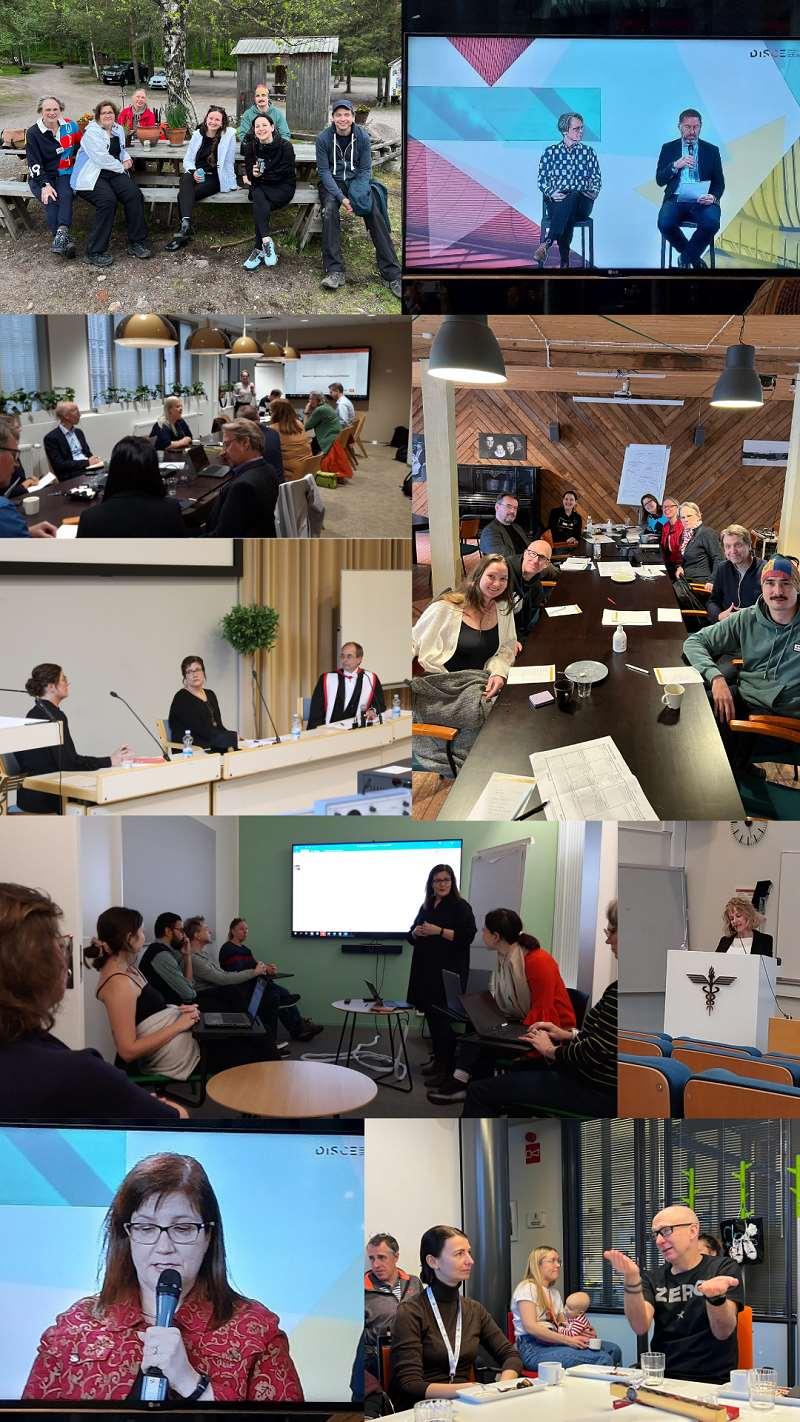
International visits and exchanges are an important part of the academic life. Even if new modes of virtual visits were developed during the pandemic, they could not replace the actual face-to-face encounters. In this sense it has been a relief that the year 2022 marked a return to normal as many of our researchers have been able to visit universities abroad and we have been fortunate to host visitors with us. I was also personally fortunate – together with some colleagues – to take advantage of the opportunities provided by the University of Turku Foundation and visited Villa Tammekann in Tarto, Estonia for a writing retreat – being outside the normal home or work office definitely is a refreshing experience.
We also realised how important the face-to-face encounters are within our own team as we spent two great seminar days in Mathildedal to discuss and share learnings about the past and plan for the future. It was also nice to discuss informally over the dinner.
While these first impressions emphasise the importance of social encounters in 2022, we can be proud of our many academic achievements. The three-year Horizon 2020 project DISCE came to an end and was celebrated by a hybrid final event in Brussels. We are extremely proud of the review panel’s positive appraisal of the project. More on our achievements in our other research projects can be found in this report.
We can also be satisfied with our teaching and educational achievements. The two cherries on the cake are the two PhD defences in entrepreneurship in 2022 (June and December). You can read more on them in this report.
Finally, our projects form the basis for societal impact. While the impact is secured by working closely with the stakeholders, we have continued to be active in social media and other channels to disseminate the research results. If you want to keep up-to-date on our projects, events and achievements, make sure to follow us on our social media channels. There are for example several upcoming conferences that may pick your interest.
I hope to meet you in one of our upcoming events, conferences or perhaps over coffee in the Turku School of Economics!
Ulla Hytti Professor Head of the Entrepreneurship Unit



Entrepreneurship is one of the areas of strength at the Turku School of Economics. Research activities at the Entrepreneurship Unit focus on two themes in particular: entrepreneurship and new working modes in the digitalised economy; and entrepreneurial behaviour and business growth. These two mainfields are connected through theoretical approaches in entrepreneurship and sociology, research methodology, science and technology studies, governance, and empirical studies. Research encompasses the processes of entrepreneurship and innovation as well as entrepreneurial behaviour from the point of view of business creation, growth, internationalisation, and renewal in different contexts in both private and public sector organisations. The Entrepreneurship Unit consists of about a dozen researchers with varied scientific backgrounds.
We work internationally and emphasise scholarly excellence and policy relevance based on solid scientific knowledge particularly in entrepreneurship. The cornerstones of our entrepreneurship research are wellestablished multidisciplinary research groups, high-profile international research initiatives and networks, such asthe European Council for Small Business and Entrepreneurship (ECSB),a strong track recordin competitive research funding as well as close cooperation with policy makers. JUFO publications 2011–2022
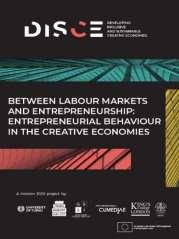
The 3,5-year DISCE research project was finalised in June 2022. At the end of September, the external reviewers commissioned by the EC evaluated whether and to what extent DISCE succeeded in its efforts to investigate and develop creative economies in Europe. DISCE passed the evaluation with flying colours: “tremendously meticulous work” as one of the reviewers stated in the panel session. DISCE was appraised for its consistent and unique methodology which consisted of a regional case study framework, statistical analysis and active interaction with stakeholders. The different work packages on statistics of cultural and creative industries, education and skills development, business modelling, innovation and earning logics, and cultural development fed successfully to each other formed a clear and coherent storyline throughout the project. Importantly, the new knowledge was co-created jointly with the relevant stakeholders. In all, DISCE was evaluated as a well-managed and executed project whose scientific outcomes are of good and partly even excellent quality. DISCE contributes to existing knowledge and discussion by providing bold and concrete suggestions on how to develop creative economies. Below the DISCE project is described in brief.
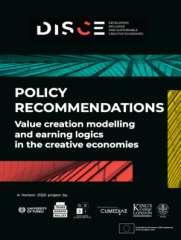
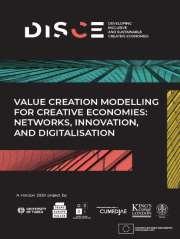
The DISCE research project was set to improve and enhance the growth, inclusivity and sustainability of the cultural and creative economies in the. DISCE investigated the relationships between higher education, skills development and creative work; emerging business models; possibilities for improved quantitative mapping; new waysto understand what the ‘growth’ of creative economiesconsistsof – and why such growth isvaluable. At the heart of the project was the question of what are inclusive and sustainable creative economies and how they can be developed. Creative practitioners and policymakers played avital role in DISCE as both producers and users of new knowledge. Combining ten regional case studies with EU-wide quantitative mapping, the aim of DISCE, ultimately, was not only to understand the EU’s creative economies, but to help shape their future.
DISCE was built on the intensive virtual field work carried out in ten European creative ecologies, namely L’Aquila and Treviso in Italy, Liepāja in Latvia, Pécs in Hungary, Enschede in the Netherlands, Leuven in Belgium, Dundee and Chatham in the UK, Pori in Finland and Lund in Sweden. The final six months of the project were dedicated to analyse the unique and rich data. Research team put the research findings together and compiled numerous research reports, articles and conference papers to highlight new stories and prospects for the creative economies of the future.
In addition to the overall coordination of the project, Entrepreneurship unit was responsible for the Work package 4: Earning logics and Business models. WP4 resulted in three main deliverables:
The report titled Between labour markets and entrepreneurship: entrepreneurial behaviour in the creative economies aims to gain in-depth understanding of creative professionals between labour markets and entrepreneurship in the creative economies in Europe. The report Value creation modelling for creative economies: networks, innovation and digitalization aims to provide insights on value creation modelling, networking, innovations, and digitalization at the organisational level in creative economies in Europe. Suggestions for policy and practice based on the findings of these reports are discussed in a report Policy recommendations: Value creationmodelling and earing logicsin the creative economies. All the DISCE reports can be found from the DISCE website https://disce.eu/
In March 2022, the Final Event with the overall theme “A call for more Inclusive Creative Economies” was organised in Brussels and online. The researchers and project leaders of DISCE presented outputs and engaged in policy discussions around the implications of the results. You can read more about the event on p. 26.
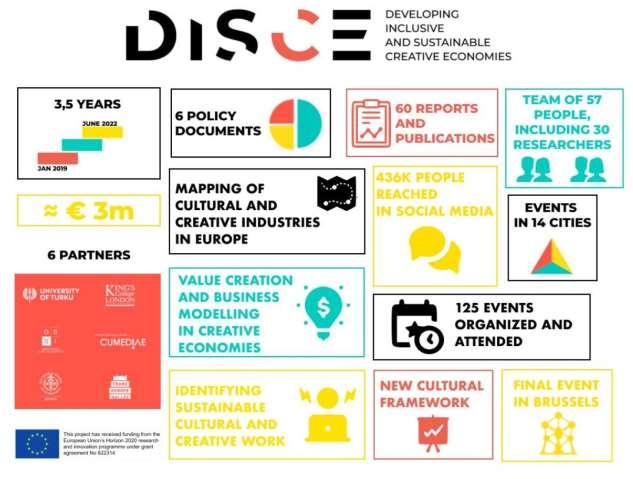
DISCE drew on the team’s highly interdisciplinary expertise. Entrepreneurship unit was the coordinator of DISCE, Professor Jarna Heinonen being the Principal Investigator of the project. The other research members of the consortium were the King’s College London (KCL) from the United Kingdom, the Gran Sasso Science Institute (GSSI) from Italy, and the Stockholm School of Economics (SSE) in Riga, Latvia. The consortium was completed with a Belgian based non-profit consultancy Culture and Media Agency Europe aisbl (CUMEDIAE) and the European network of non-governmental cultural centres based in Sweden Trans Europe Halles (TEH), who together assumed both the communications and stakeholder engagement within the CCIs. DISCE ran for three and a half years and was funded by the Horizon 2020 Programme of the European Commission.
Read more on DISCE from the website (https://disce.eu/) or contact the DISCE PI Professor Jarna Heinonen jarna.heinonen@utu.fi or the project coordinator Elisa Akola elisa.akola@utu.fi
Bringing together a series of new perspectives and reflections on creative economies, this insightful Modern Guide expands and challenges current knowledge in the field. Interdisciplinary in scope, it features a broad range of contributions from both leading and emerging scholars, which provide innovative, critical research into a wide range of disciplines, including arts and cultural management, cultural policy, cultural sociology, economics, entrepreneurship, management and business studies, geography, humanities, and media studies.
Order: https://www.eelgar.com/shop/gbp/a-modernguide-to-creative-economies9781789905489.html
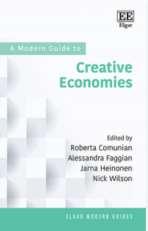
Designed to push the boundaries of understanding on the topic, this Modern Guide initially addresses definitional and methodological challenges, before offering new perspectives on the theory and practice of creative and cultural entrepreneurship, and exploring the role of networks and the importance of place and mobility. The book concludes by re-imagining creative economies, raising issues of inequality and justice, care and solidarity, and opportunities for value recognition, while providing new visions of inclusivity, cultural capability, and future development.
The proposal and initial behind the book coincided with the start of the DISCE project where all four editors were involved. While the book does not include specific outcomes or data from the DISCE project per se, it does include many reflections that have fed and supported the thinking across the research.
The need for high-skilled internationals is broadly recognised in Finland. HIWE is a collaborative research project between Turku School of Economics and the University of Eastern Finland which started in 2022. The research seeks an understanding of how to get more high-skilled internationals involved to Finnish working life, innovation, and entrepreneurship. HIWE research concentrates on gaining bottom-up knowledge on how these talents experience the Finnish labour market and entrepreneurial opportunities in the country. The central question is whether the existing innovation policy and practices can respond to the challenges that international experts consider important to them.
The researchers of the project aim to develop and test a new type of participatory model for the development of innovation policy. This cooperative model brings together international experts and key stakeholders, and its goal is to challenge traditional hierarchical decision-making in the society. The model developed in the HIWE project supports the participation of international experts in the production of policy innovations. The project produces cooperatively written policy recommendations and a road map, which can be used to transfer the results of the project to policy actions and practice.
The research project will be conducted in 2022–2024. The team leader in Turku is Professor Ulla Hytti (ulla.hytti@utu.fi), the research team in Turku includes also Project Researcher Satu Aaltonen (satu.aaltonen@utu.fi), Senior Researcher Tommi Pukkinen (tommi.pukkinen@utu.fi) and Doctoral Researcher Anna Elkina (anna.s.elkina@utu.fi). Further information on the research consortium and on the project from the project website: www.hiwe.fi
Entrepreneurship Unit and VTT Technical Research Centre of Finland Ltd are producing jointly an evidencebased study of business start-up activity for Ministry of Economic Affairs and Employment of Finland. The aim of our research project isto create a snapshot of business start-up activity in Finland and the factorsinfluencing it on the basis of the GEM survey data, Statistics Finland's data and other national and international reference data, research reports, scientific articles and project workshops.
The study will provide recommendations for policy measures and choices which can contribute to increasing the business start-up activity and to boosting the founding of growth-oriented employer companies in Finland. Through various comparative analyses based on literature, statistics on entrepreneurial activity and entrepreneurial framework conditions across countries our results indicate that Finland has an opportune environment for entrepreneurship, but we are still missing the growth-oriented entrepreneurs. During 2022 we organised two workshops with stakeholders from different ministries and stakeholders in which we discussed and worked with preliminary findings of the project. First workshop focused on different factors that influence the founding rates of new businesses and the possible root causes for low growth intentions among new entrepreneurs. Second workshop covered the comparisons between Finland and selected countries and which factors should be in foci in Finland when Finland is compared to other countries.
The focus of the study is on supporting the implementation of the Entrepreneurship Strategy under the Government Programme. The project runs for 2021–2023 and is led by Professor Jarna Heinonen and the project team in Entrepreneurship unit includes Adjunct Professor Pekka Stenholm and Senior researcher Tommi Pukkinen.
For more information: Professor Jarna Heinonen (jarna.heinonen@utu.fi) Senior researcher Tommi Pukkinen (tommi.pukkinen@utu.fi) and Adjunct Professor Pekka Stenholm (pekka.stenholm@utu.fi) .
The main aim of the Transforming Entrepreneurship Education (acronym: TrEE) project is to change direction and practice of entrepreneurship education in Europe. The TrEE project is about creating the resilience that is needed to deal with the major crises of our times, and the growing complexities of the societal challenges that come with them,both ecologically aswell associally.Entrepreneurship hasthe potential tocontribute tosolving as well as worsening some of such contemporary societal challenges. In this project, we propose to decouple EE from the creation of (high-growth) businesses, and instead put its (creative) potential to work to help enact more just futures, for ‘people’ as well as ‘planet’. This entails shifting towards innovating without exhausting planetary resources, addressing social inequalities, andbecoming moreinclusive. In short, this entails a justice for all life; human and more-than-human. This means making changes in the way we currently enact EE, finding new pedagogical premises, and developing new course formats, materials, and assignments.
Concretely the project aims at elaborating new pedagogical approaches; developing & validating relevant course designs, materials, and teaching interventions and at organising training activities (educate-theeducator).
The TrEE project is conducted between December 2022 and December 2024. The project has received funding from Erasmus+ Cooperation Partnership grant.
The consortium consists of representatives from six European higher education institutions: Professor Karin Berglund from Stockholm Business School at Stockholm University, Professor Sarah Dodd from the University of Strathclyde, Professor Ulla Hytti from the University of Turku, Professor Sarah Jack from Stockholm School of Economics, Serxia Lage Arias from the Instituto de Educación Secundaria Fernando Wirtz Suárez and Associate Professor Karen Verduijn from Vrije Universiteit Amsterdam.
More information on the project from the project website: transformingee.eu and Professor Ulla Hytti (ulla.hytti@utu.fi) See also https://www.youtube.com/watch?v=4BV_dJNCpjg
NordAqua is a five-year (2017–-2022) Nordic Centre of Excellence (NCoE) funded by NordForsk through the Nordic Bioeconomy Programme. The Entrepreneurship Unit is a part of the NCoE with a specific role in encouraging and studying commercialization and entrepreneurship within the NCoE. Entrepreneurship Unit has contributed to the project by bringing in better understanding on the challenges in commercializing research on blue bioeconomy.We have studied how scientists perceive and make sense of commercialization and the potential of their own ideas and business opportunities. Furthermore, we have investigated how scientists evaluate and make sense of their own troubles and successes in between science and business. The research findings have been published in scholarly books and journals.
During the project the NordAqua researchers have also participated to some targeted workshops on entrepreneurship as well as the UTUGS course “Entrepreneurship for Research Professional” organised by the Entrepreneurship Unit. These interventions have supported NordAqua researchers to understand what it takes to commit oneself to entrepreneurial behavior and new business creation as well as to assess their own relationship to entrepreneurship. Furthermore, professors Jarna Heinonen and Ulla Hytti have served as mentors for several NordAqua researchers and supported them on their future career steps.
For more information: Professor Jarna Heinonen (jarna.heinonen@utu.fi) and www.nordaqua.fi.
Digital Futures is the Academy of Finland profiling funding that extends over several years and finances researchers and research activities related to the digital futures and digitalisation at different faculties at the University of Turku and especially at the School of Economics. The leader of DF initiative is professor Anne Kovalainen. Digital Futures has brought forward new initiatives, new collaborative ties, publications and projects both across faculties and within faculties. At School of Economics, one associate professorship in Information Systems Science has been established with Digital Futures funding.
At the Department, the Digital Futures research focuses on platform economy and the new modes of work led by Senior Research Fellow Seppo Poutanen. This was further extended to a new Business Finland funded ReGrow project, which ran from 2020 to 2022 (see p.13). Generally, the national level collaboration of Digital Futures includes cooperation with Research Institute of the Finnish Economy (ETLA), VTT and FIOH. International collaboration has been going on with several universities in 2022, including University of California, Northeastern University, University of Paderborn and University of Oslo.
DF researchers Anne Kovalainen, Seppo Poutanen and Johanna Arvonen continued their analyses of remote work in Finland in the conditions of the COVID-19 pandemic. According to their most recent publication, the institutional trust, combined with technological digitalisation, has embedded the smooth structural transition to teleworking, and it has reduced or made redundant the need for the close supervision of individual employees. For details see Kovalainen, A., Poutanen, S. & Arvonen, J. (2022): “Luottamus ja valvonta pandemian aikana”, Työelämän tutkimus 20(3) (https://doi.org/10.37455/tt.112955).
By the end of the year 2022 Professor Anne Kovalainen and Senior Research FellowSeppo Poutanen finalised the manuscript of their new monograph “Skills, Creativity and Innovation in the Digital Platform Era: Analysing the New Reality of Professions and Entrepreneurship”. The book will be published by Routledge in the spring of 2023, and it brings together two important subject areas: the separate research topics of professions, platforms and entrepreneurship, and the various dimensions of what platformization means to work and to professions in contemporary societies. For example, platforms have become a powerful actor as enablers and reorganisers of work, creating new types of inequalities but also expanding the market relations for new professions such as social influencers. For more information see: https://www.routledge.com/Skills-Creativityand-Innovation-in-the-Digital-Platform-Era-Analysing/Poutanen-Kovalainen/p/book/9780815360704#
Digital Society is an international project initiated by DF researchers and researchers from Paderborn University Faculty of Arts and Humanities, in 2020, and started in 2021, extending by focus and participating members. The project addresses the key elements of the contemporary digital work, economy and society formation in European countries and gathers data in multiple locations. The specifics of the project can to be found out at the homepage of the project at TCLS from the Spring 2022.

The ReGrow project (2020–2022), funded by Business Finland and hosted by TCLS, explored key current and future economic issues in the era of data economy and platform economy and asked questions about the relations between platform firms and new forms of work, technology firms and innovations, and knowledge spillovers. The University of Turku part of the ReGrow-project was specifically interested in the platform economy which has introduced new ways of organising high-competence work related to value creation in companies and the development of innovations (e.g. Poutanen & Kovalainen & Rouvinen, 2020; Kenney & Zysman, 2019). The ReGrow project continued the ongoing research on digital society and platform economy, platforms, digital expertise work and platform work by the DF researchers. Part of the innovation research focused on the new order of high-competence and digital work. Among the questions asked was: the Covid19 situation has changed the ways innovations are developed, but to what extent and how permanently? The project also examined the transitions and the transfer of innovations in employee / entrepreneurial positions with the help of unique data sets.
During 2022 the ReGrow-project analysed, among other things, the effects of COVID-19 pandemic to technology firms’ innovation capabilities and future strategies in relation to their innovation work, skilled employees and network activities. The project collaborated both nationally and internationally with Finnish Institute of Economy (ETLA), VTT, Oxford University, Waterloo University and Northeastern University. The ReGrow project was wrapped up with an international seminar “Finland back to the path of growth, but how?” in Helsinki 9.11.2022 (see https://www.etla.fi/etla-tapahtumat/regrow-seminaari-suomi-takaisin-kasvu-urallemutta-milla-keinoin/), where Professor Anne Kovalainen and Senior Research Fellow Seppo Poutanen introduced their research results on the experiences of Finnish technology and platform companies during the COVID-19 pandemic. The surprising diversity of such companies was elaborated, as well as their relatively good resilience through the pandemic time. More information can be found at the project’s homepages: https://regrow.fi/
International cooperation has always been an important part of our work, and we have had international faculty both in research and teaching positions. In addition tointernational faculty, we consider researcher and teacher mobility to be very important and encourage our doctoral students, as well as postdoctoral researchers, to benefit from international visits.
Researchers visiting other universities:
• University Teacher Sanna Ilonen, Grenoble École de Management as an ECSB Virtual Visiting Scholar (2022)
• Doctoral Candidate Matti Karinen, Josip Juraj Strossmayer University of Osijek and CEPOR, Croatia (August–December 2022)
Researchers from other universities visiting us:
• Postdoctoral Researcher Ufuk Gür, TU Delft as an ECSB Virtual Visiting Scholar (Spring term 2022)
• Professor Dylan Jones-Evans, University of South Wales (September 2022)
• Senior Lecturer Jonathan Scott, University of Waikato, New Zealand (November–December 2022)
• Research Director Lena Weber, University of Paderborn, Germany (September–December 2022)
• Doctoral Candidate Shihao Wei, Xi’an Jiaotong University, China (September 2022–September 2023)
We collaborate actively with a number of other national and foreign universities, institutions and networks. In 2022, we have conducted joint research projects at least with the following partners:
Aalto University, Finland
Aston University, UK
Audencia Business School, France
Babson College, USA
De Paul University, USA
Durham University Business School, UK
ETLA - Elinkeinoelämän tutkimuslaitos, Finland
EM Strasbourg Business School, France
ESCP Europe Paris, France
Finnish Institute of Occupational Health, Finland
Gran Sasso Science Institute, Italy
Grenoble Ecole de Management, France
IES Fernando Wirtz, Spain
King’s College London, UK
Kingston University, UK
Lancaster University, UK
Ludwig-Maximilians-Universität, Germany
Lund University, Sweden
Nord University, Norway
Northeastern University, USA
Northumbria University, UK
NTNU, Norway
Paderborn University, Germany
Royal Holloway, University of London, UK
Research Institute of the Finnish Economy, Finland
Stockholm School of Economics in Riga, Latvia
Stockholm University, Sweden
Universitat Autonoma de Barcelona, Spain
University of California, USA
University of Eastern Finland
University of Oslo, Norway
University of Pretoria, South Africa
University of Southern Denmark, Denmark
University of Strathclyde, UK
University of Texas, USA
University of Vaasa, Finland
University of Waikato, New Zealand
VU Amsterdam, the Netherlands
Xi’an Jiaotong University, China
Åbo Akademi University, Finland
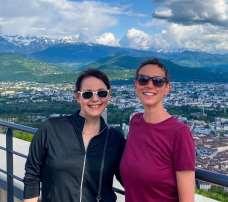
Sanna Ilonen was nominated to the first cohort of ECSB’s Virtual Visiting Programme. The programme aims to support early career researchers to develop their research agenda by collaborating online with faculty, researchers, and networks at a selected host institution.
Sanna took part to the programme from the beginning of March to the end of June 2022. Sanna was a visiting scholar at Grenoble Ecole de Management and her host was Professor Martina Battisti. During the visiting scholarship Sanna and Martina worked on a joint manuscript project that was presented at RENT 2022 Conference in Naples, Italy. During her visiting scholarship Sanna had also chance tovisit Grenoblefortwo days as part of her 3E Conference trip to Dijon. ECSB’s Virtual Visiting Programme was a great way to establish networks and work on a joint article project. The collaboration has continued ever since.
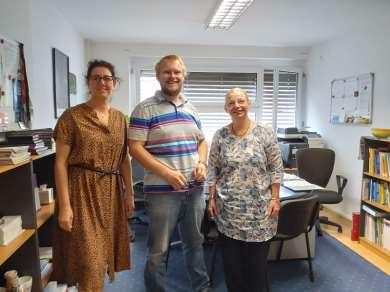
Doctoral researcher Matti Karinen has been on an extensive research visit at CEPOR and ICES in Croatia since August. His research visit is a continuation of a long-standing relationship between the entrepreneurship unit at Turku School of Economics and Professor Emerita Slavica Singer at the University of Osijek and the independent Zagreb-based research institute CEPOR.
CEPOR is the Croatian SME and Entrepreneurship Policy Centre, a research-led think tank located at the institute of Economics in Zagreb Croatia and headed by Dr. Sc. Mirela Alpeza. CEPOR conducts and disseminates research on SMEs and entrepreneurship in Croatia, while also providing input for policy development as well as advocating around SME and entrepreneurship issues. CEPOR is also the domestic partner for the Global Entrepreneurship Monitor (GEM).
At the University of Osijek Matti is affiliated with the International inter-university Center for Entrepreneurial Studies (ICES) and its doctoral programme. ICES is a first-of-its-kind entrepreneurship focused program in Europe devoted to interdisciplinary research with entrepreneurship and entrepreneurial behaviour at its heart. Turku School of Economics is a founding partner in the ICES program.
While in Croatia, Matti is working on his doctoral project exploring legitimacy dynamics in sustainable Palm Oil. In addition, Matti will participate in seminars, experience sharing as well as research and program collaboration in sustainable entrepreneurship and entrepreneurial action. Matti’s research visit continues in 2023.
Shihao Wei from Xi’an Jiaotong University, China started his one-year position as a visiting PhD student at the Entrepreneurship Unit, University of Turku on 22 September 2022. Shihao considers the research visit as a good opportunity to communicate and collaborate with different research groups and professionals. During his research visit, he focuses on exploring the role of the external environment in different types of entrepreneurial activities, such as informal entrepreneurship and innovative entrepreneurship. During the visit, Shihao has collaborated with Pekka Stenholm on some research projects and they have finished a paper that explores the influence of income inequality on innovative entrepreneurship. Moreover, they also started a new research project on informal entrepreneurship.
In addition, Shihao also actively participates in the bi-weekly unit meetings and research seminars. Hence, he has the opportunity to talk about his work and possibilities for future collaboration. In his leisure time, he enjoys fantastic trekking routes and trips. For example, he visited Northern Finland, Lapland, enjoying the snow world and chasing northern lights. Shihao feels that the visit broadens his horizons and brings him new energy to focus on research.

Entrepreneurship research team got together in a 2-day research seminar in Mathildedal to reflect past successes and learnings as well as to plan ahead for new research ideas in June 2022. After the pandemic it was also great to do some hiking and enjoy dinner in the outdoors together.
To create space and energy for research, our team members visited also Villa Tammekann in Tarto, Estonia for short writing retreats during the autumn 2022 Granö Centre | Villa Tammekann
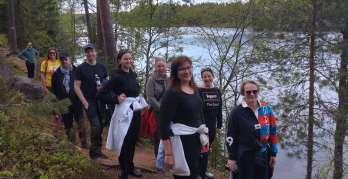
The Entrepreneurship Unit hosts or is a national partner in following research networks that work as platforms for active collaboration in research, knowledge dissemination, teaching and data collection:

We host the Secretariat of the European Council for Small Business and Entrepreneurship (ECSB). The ECSB is a research-driven nonprofit organisation whose main objective is to facilitate the creation and dissemination of new knowledge through research and the open exchange of ideas between academia, education, policy and practice. Professor Ulla Hytti is the President of the ECSB Board (2021–2023) Through the ECSB we reach a network of about 2000 entrepreneurship researchers and educators world-wide.
https://ecsb.org/
NordAqua is a five-year (2017–2022) Nordic Centre of Excellence (NCoE) funded by NordForsk through the Nordic Bioeconomy Programme. The NordAqua NCoE is a hub of 10 Nordic universities and research institutes from 3 different Nordic countries, along with several industrial and societal partners. With the strong cooperation of its partners, the NordAqua consortium has the potential to accelerate the transition to the bioeconomy by promoting sustainability as an attractive investment for industry.
https://www.nordaqua.fi/

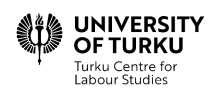
Turku Centre for Labour Studies TCLS is headquartered at the Department of Management and Entrepreneurship. TCLS is a research network which gathers multidisciplinary research on new modes of work and working life, including entrepreneurship and selfemployment. TCLS acts at the University level and connects the eight faculties of the University of Turku, Åbo Akademi University and several other Research Units nationally and internationally. Between the years 2020–2022 TCLS hosted Business Finland funded project ReGrow (www.ReGrow.fi), which addressed new modes of work and innovations in post-Covid-19 economy.
TCLS organises an international multidisciplinary research conference every second year as well as local seminars, and does outreach activities locally and nationally, following the third task of the University. International work and working life research conference WORK2021 was organised as a virtual series of three conferences in August, October and January 2021. Next WORK conference will be organised in 2023. TCLS coordinates the Multidisciplinary Studies in Work, Working life and HR Research (TYHE) minor programme developed and offered together with UTU faculties and Åbo Akademi.
https://www.utu.fi/en/university/turku-school-of-economics/turkucentre-for-labour-studies-tcls

In entrepreneurship, we offer education at all academic degree levels. In addition, our faculty is active in training programmes offered for example to executive education, TSE exe, and to the Open University and in increasing amount also in other faculties of the University of Turku. The strengths of entrepreneurship education are embedded in the faculty’s close connection to research in entrepreneurship.We also collaborate closely with student associations and Boost Turku – an open student-based entrepreneurship society for new start-ups. Guest lecturers from business life and international faculty are also a regular part of courses. In 2020, we introduced the new Entrepreneurs-in-Residence scheme to develop the ongoing collaboration with entrepreneurs as

In Entrepreneurship studies, we aim to advance students’ skills and know-how to recognise, create and exploit new business opportunities in all sectors. In our teaching we believe that entrepreneurship is about how you create a successful organisation in a dynamic and constantly changing business environment; how to recruit innovative employees, how to coordinate their work and how to build a productive and entrepreneurial organisational culture. In addition, we offer students both individual and societal views of entrepreneurship, for example an understanding of what kind of career opportunities entrepreneurship offers and how entrepreneurship is promoted in society.
Entrepreneurship as a discipline is highly research-oriented with numerous international research projects and significant outcomes (e.g. publications, scientific and societal impact). Consequently, Entrepreneurship is a relatively small discipline at the Turku School of Economics in terms of the number of major students. It is however, avery popularminor subject and also single courses reach wider audiences. Furthermore,the faculty has contributed to guiding and supervising degree students across disciplines. In addition, according to the spirit of the Entrepreneurial University Strategy an increasing amount of entrepreneurship studies are being offered to other faculties based on their needs.
Our aim at the bachelor level is to provide students with a theoretical and practical knowledge of entrepreneurship. Our bachelor studies focus on the entrepreneurial process and understanding the role of entrepreneurship at an individual and at a societal level. Entrepreneurship studies provide tools for students to work in a constantly changing, innovative business environment after graduation no matter their career choice. During entrepreneurship studies we emphasise active connections to business life e.g. through visiting lecturers and excursions.
Our master studies focus on enhancing research skills through courses related to theoretical perspectives, classics and current issues in entrepreneurship research and research methods. Master studies provide the opportunity to specialise in an interesting research area.
Making a Difference is a course targeted to the students finalizing their studies in the International Management and Entrepreneurship program. It is organised in collaboration with the subjects of Entrepreneurship, Management and Organisation and International Business. The course is set for addressing a topical real-life phenomena and wicked problems, and accordingly during 2022–2024 the focus of the course is on resilience.
The aim is to unfold resilience and its relevance to contemporary firms in coping with and recovering from uncertainty, for instance, caused by the COVID-19 pandemic or invasion. In its on campus, version resilience was discussed through the lenses of management, entrepreneurship and international business. First approach was provided by professor Juha Laurila who detailed the connection between crises and resilience and how organisations can adapt to crises through new cognitive frames. Such conversation was amplified by principal lecturer (LAB University of Applied Sciences), adjunct professor Lasse Torkkeli, who discussed how internationalization can help or hinder the resilience of Finnish SMEs. University lecturer Elina Pelto from International Business provided the students with very recent results from her case study on a multinational firm which faced the sudden outcomes of the Russian invasion of Ukraine. Finally, senior research fellow Pekka Stenholm discussed resilience from the perspective of entrepreneurship and entrepreneurs.
In addition to on-site campus version the course was offered as an online version which attracted about 50 students.
The primary purpose of PhD studies is the preparation of a piece of original entrepreneurship research. Our PhD studies are designed to train doctoral candidates as independent researchers, so that they can claim professional standing as academic staff or in a profession requiring skills in entrepreneurship research. PhD studies consist of a dissertation and PhD courses. The entrepreneurship research seminar series provides our doctoral candidates with excellent learning opportunities and also possibilities to discuss their PhD projects with peers and senior researchers and professors. In 2022, we benefited from the virtual research seminars and invited several guest speakers in addition to our own doctoral researchers Additionally, international research visits and fellowships are encouraged as a part of the PhD process.
There are eight active doctoral researchers in Entrepreneurship. The following three doctoral researchers were employed by the Entrepreneurship Unit in 2022:
Anna Elkina Entrepreneurial identity formation through entrepreneurial experience: an autoethnographic research
Mohamed Farhoud Reward-based Crowdfunding as a catalyst of social enterprises’ Legitimacy, Autonomy, and Performance
Matti Karinen
Pathways to Primary Sector Legitimacy
Entrepreneurship team members act as teachers in doctoral programmes and PhD courses also internationally.In 2022, Professors Jarna Heinonen and Ulla Hytti organised each one course for PhD students in the International Centre for Entrepreneurial Studies in Osijek, Croatia. Professor Ulla Hytti contributed to two entrepreneurship courses offered by NORSI – Nordic Research School in Innovation and Entrepreneurship.
In addition, entrepreneurship has an important role in executive education programmes offered by TSE exe. Members of our staff work as teachers and experts in the programmes and also supervise EMBA and JOKO theses. Our entrepreneurship faculty contributes mainly to one of the four learning goals of the EMBA programmes, namely “the graduates have the ability to lead and contribute to business renewal”. The main themes of entrepreneurship discussed in the programme include for example an entrepreneurial twist and corporate entrepreneurship at work as well as new business opportunities and opportunity creation and lean start-ups. The EMBA students submit an assignment on “Entrepreneurial thinking and business models” to Senior Research Fellows Pekka Stenholm and Tommi Pukkinen based on their one-day entrepreneurial workshop. In addition, Professor Jarna Heinonen serves as Chair of the TSE exe Advisory Board the role of which is to support TSE exe in designing top-quality and responsive executive education in the changing society.

MSc Kaisu Paasio defended her doctoral dissertation “Making sense of the entrepreneurial university – A social constructionist view” on the 22nd of June 2022 in the Turku School of Economics, University of Turku. Kaisu was happy to have Professor Ulla Hytti and Professor Dylan Jones-Evans (University of South Wales) as her supervisors and Adjunct professor Saija Katila from Aalto University and Professor Luke Pittaway from Ohio University as pre-examiners of the dissertation. Professor Luke Pittaway served as an opponent in the defence.
In her study, Kaisu takes a critical stance towards the mainstream research of the entrepreneurial university and add to our understanding from a fresh perspective by zooming in to the university to focus on the lived experience of university personnel and setting individuals as units of analysis. The study builds on social constructionism, applying narrative methodology and a sensemaking lens to investigate how an entrepreneurial university is constructed from within the university. Voice is given to personnel in a university that has a strategic commitment to becoming entrepreneurial, and their stories are told through Kaisu’s interpretation.
The research material consists of group discussions in which the study participants discuss entrepreneurship in the university context broadly. An unstructured interviewmethod was employed with an eye to giving plenty of room for the participants’ spontaneous narration and storytelling. In the analysis, attention was given to the intertwinement of storytelling and sensemaking. Kaisu focused on how the university personnel talked about entrepreneurship in the university and what kinds of meanings they gave to entrepreneurship, university and the entrepreneurial university.
As an outcome of the study, Kaisu presents six stories of sensemaking and four local entrepreneurial university metanarratives that derived from these stories and the sensemaking processes. The six stories provide different perspectives on the entrepreneurial university, in which the sensemaking processvariously coversparticipants’ interpretationsof entrepreneurship, negotiation about a university, reflection on the everyday work at the university and a critical consideration of the strategic vision of the university. The entrepreneurial university metanarratives – here named ‘much ado about nothing’, ‘members’ club’, ‘progress’ and ‘illusion’ – further address the plurivocality of the phenomenon, that instead of one, there are many understandings of the entrepreneurial university that coexist concurrently within the university.
The results of the study indicate that the entrepreneurial transformation not only concerns the structures and functions of a university, but also is a matter of the university personnel’s collective sensemaking. This study thus makes a theoretical contribution by providing a new, alternative perspective to the entrepreneurial university conceptualization. It is more nuanced and aligned with the internal and contextual aspects of the phenomenon and critical in the sense that it is attentive to the prevailing interpretations of an entrepreneurial university that tend to be rather stagnant and dualistic. The methodological contribution of this study comes from the use of the sensemaking lens in exploring the lived experience of university personnel as they negotiate the entrepreneurial transformation and construct their understanding about the entrepreneurial university, which allows for a deeper interpretative understanding of the phenomenon. The discussion of the results also advances our understanding concerning the practical implementation of transformation efforts, highlighting the need to understand and make sense of a new strategy as critical elements of engagement.
Overall, the thesis contributes to entrepreneurial university research and discussion with novel theoretical, methodological and empirical results and adds to the existing knowledge of the interpretive literature on the entrepreneurial university.
The dissertation is available on https://urn.fi/URN:ISBN:978-951-29-8886-0
 Valerie Goby
Valerie Goby
PhD Valerie Goby defended her dissertation in Entrepreneurship entitled ”Emirati women’s liminal economic agency: Gendered space within modernity and tradition” at the University of Turku on 2.12.2022. Valerie was honoured to have Professor Anne Kovalainen and Professor Ulla Hytti from University of Turku as her supervisors and Professor Arolda Elbasani (New York University) and Professor Vesa Suutari (University of Vaasa) as the pre-examiners of the thesis. Professor Suutari acted also as an opponent in the deference.
Valerie’s dissertation explores Emirati women's liminal economic agency in the rapidly modernising Arabian Gulf country, the United Arab Emirates. The study represents a complex research area in which elements of modernisation such as women's increasing educational and professional qualifications are materialising against a cultural landscape traditionally characterised by domestic women, their financial dependence on men, and gender segregation. Valerie employs a variety of methodologies to investigate the new spaces that are being moulded by the contradictory forces of modernisation and traditional values associated with women. The theoretical framework of the research is based on three intersecting analytical lenses, namely, space, the Islamic conceptualisation of gender, and localised Islam.
The thesiscomprisesof a synthesisand four individual studies. Thefirst study mapsthe area of Valerie’s research which is the evolving space of women's economic agency, a space interactively contoured by empowering gendered state policy and restrictive gendered cultural traditions. These two potencies mutually influence the potential for positions of change for women. The second study explores how Emirati women are enacting leadership both in terms of self-reported behaviours and employee perceptions. The results of this study reveal highly contextualised enactments of leadership through the merger of state policy encouraging the rise of women to leadership roles and patriarchal subordinations of women. The third study investigates women employees in the public sector and finds that women have considerable sense of agency generated by their state-endorsed belief that they are contributing to national development.Itsfindingsalso reveal that young women regard the workplace asan important extra familial social setting in which they can independently forge personal relationships. The fourth study employs the conceptual lens of localised Islam to explore women's discursive legitimation of their economic agency in terms of Islamic dogma and their attribution of objections to this agency as deriving solely from cultural traditions.
The contribution of the research is that its findings add to the reframing of transnational gender studies as itillustrates thatfreedoms and agenciesmay exist invery differentformsfrom Western interpretations of these constructs. Valerie’s identification of a case in which elements of patriarchal subordination fuel greater agency among women leaders demonstrates a highly contextualised relational operation of subordination and agency thus negating the binary of power versus subordination. Valerie’s four studies illustrate a fluid interpretation of development of state, culture, and gender, and thus problematise the assumption of a dualism of modernity versus tradition.
The dissertation is available on https://urn.fi/URN:ISBN:978-951-29-9051-1

Our activities contribute significantly to the third task of the university: societal impact and interaction with society. Our close relationships with business life and policy makers indicate that our expertise in entrepreneurship research, education and development is relevant for and appreciated by society in general, and our customers in particular. Our faculty serve as board members in different organisations and their expertise is continuously requested in national and international expert assignments.
The research done at the Entrepreneurship Unit has wide impact as outcomes have contributed to societal policies and decision-making. Our research has been used for instance in designing legislation, re-organising the activities of specific public agencies supporting SMEs A good example of such research activities with both scientific and societal impact is DISCE research project funded by the Horizon 2020 Programme of the European Commission. Below are some examples of our activities in 2022.
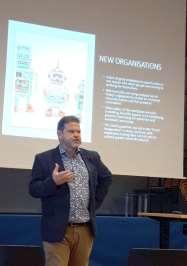
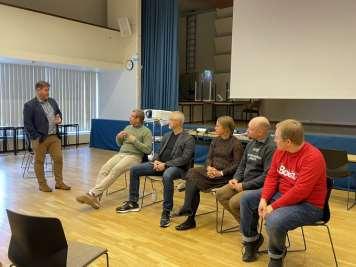
On 1.9.2022 faculty members and students at the University of Turku interested in entrepreneurship at the University of Turku gathered to discuss and to learn from recent research on this topic. Presenters leading through the topic included: Vice-Rector, Professor Mika Hannula (University of Turku), Assistant Pro-Vice-Chancellor (Enterprise), Chair in entrepreneurship (University of SouthWales) Dylan Jones-Evans (picture below on the left) and Project Manager, PhD Kaisu Paasio.
In addition to the presentations, the seminar included a panel to discuss what is being done – and could be done – to foster entrepreneurship at the University of Turku. The panellists were: CEO of Dagsmark Petfood Ltd, Entrepreneur-in-Residence Laura Strömberg, Head of Corporate Collaboration, Faculty of Technology (UTU) Timo Vasankari, Lecturer, Faculty of Humanities (UTU) Kalle Konttinen, Collaboration Manager, Partnerships and Strategic Engagement (UTU), Entrepreneur Mikko Pohjola and Executive Director, Boost Turku Olli Massala
On March 3rd, 2022, DISCE came to a closure with a Final Hybrid Event held in Brussels. The event summarised and presented the project's findings and discussed and co-created preliminary policy recommendations with the EU officials and other stakeholders. The event wasbroadcasted through a YouTube live stream for thewider audience tofollowand interact.
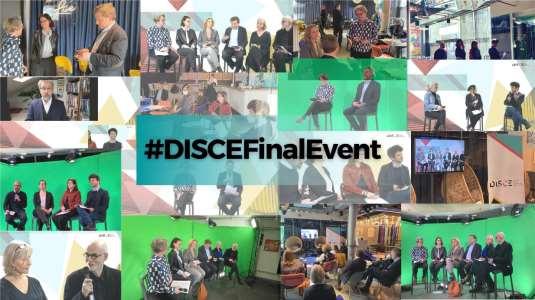
The event was developed around three panels and was started with welcome speeches by Rickard Bucksch from the European Commission and Jarna Heinonen, the Principal Investigator of DISCEfrom the University of Turku. After that Tiffany Fukuma (Trans Europe Halles) discussed in the panel 1 with Jonathan Gross (King's College London) and Birgitta Persson (Olivearte Cultural Agency) the co-creation activities in DISCE. Stakeholder engagement through active co-creation and interaction has played an important role throughout the project.
Panel 2 “A call for reshaping research, policy and practice for more inclusive creative economies” was built around the work packages of DISCE and presented the respective research findings. Leaders of WP2 Alessandra Faggian and Alessandro Crociata from Gran Sasso Science Institute concentrated on CCIs Identification, mapping and statistics. They pointed out the need for improving the quality and the harmonization of cultural statistics.
Leader of WP3 Roberta Comunian from King’s College London continued with the main results of Work Package 3 that focused on the skills and education of creative workforce. WP3 looked at how individuals can have access to sustainable creative work during the different life stages and identified opportunities and barriers they face to contribute to their local creative economies. For example, when entering a creative profession enabling factors can be specific schemes or initiatives, access to affordable housing/workspaces, advice on employment rights, financial management, connecting with wider support networks, but also a supporting family (or friend/colleague). Inhibiting factors, on the other hand, can be work practices relying on unpaid labour or exploiting the inexperience of people entering these careers.
Work Package 4 concentrated on business models, value creation and innovation. Leader of WP4 Ulla Hytti from University of Turku noted that the creative freelancers and entrepreneurs do not identify strongly as entrepreneurs but based on the findings are entrepreneurial in many ways. However, the sustainability of their entrepreneurial activities is questioned by the taken-for granted ‘creative deal’, a set of institutionalized practices (attitudes, ways of action, norms, rules) such as working for no or low money, using household-money or doing everything by oneself. Challenging the unsustainable creative deal calls for changes already during the creative education but also wider attitudinal and systemic changes in the society.
Finally, Nick Wilson and Jonathan Gross from King’s College London presented the key results of the Work Package 5 that has aimed at understanding what the growth of creative economies can consist of and why and how such growth is valuable. WP5 introduced a Cultural Development Index that is a new policy framework and tool to be used at local and regional city level.
The event concluded with a Panel 3 – a policy roundtable – where experts discussed the policy implications stemming from the research carried out within the DISCE project. The panel 3 was moderated by Ignasi Guardans (CUMEDIAE) and the panellists being Xavier Troussard, Head of the New European Bauhaus Unit – Joint Research Centre at the European Commission, Barbara Stacher, Senior Expert at European Commission, DG EAC, Anita Debaere, Director at PEARLE* – Live Performance Europe and Annick Schramme, DISCE Advisory Board member and Academic Director of the Masters in Cultural Management at the University of Antwerp together with Jarna Heinonen. The vivid discussion touched upon various topics such as education, tension between entrepreneurship and creativity, the value of creative work, general income and the role of digitalization and innovation in the creative work and gave many valuable insights for the researchers to consider when finalising the policy reports in the final months of the project.
Altogether DISCE produced two policy briefs and four WP-specific policy recommendations as official project deliverables. In addition, the DISCE results have been communicated in several policy events at international and national level. All the papers and reports developed throughout the project are accessible for everybody to have a long-term impact. Given thevast amount of unique research data available, DISCE researchers are committed to disseminate the findings further in the coming years.
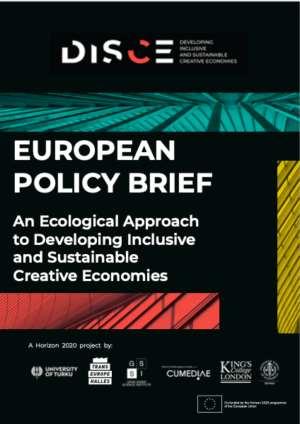
All DISCE deliverables and scientific publications can be accessed on: https://disce.eu/
https://cordis.europa.eu/project/id/822314/results
Entrepreneurs in Residence (EiR) is a programme that involves entrepreneurs in the activities of Turku School of Economics in variety of ways. The objective of the EiR programme is to increase the participation and presence of active entrepreneurs in the school. EiRs – CM-trader Hannu Aaltonen, Founder and CEO of Dagsmark Petfood Ltd Laura Strömberg and Founder and CEE of Zefort Ltd Jussi Karttila – have been actively participating in our teaching but also shared their experiences with wider audiences.
We organised an EiR-webinar in Zoom on June 3rd for the faculties of University of Turku on 3rd of June. In the webinar, we discussed the principles of Entrepreneurs in Residence concept and shared related experiences. The webinar was targeted for faculty leaders and members in different faculties at University of Turku. The aim was to give faculties’ tools to think whether the EiR programme would be of added value to your students and faculty members, and also provide concrete advise to continue in their endeavours if they want to establish their own programme. The EiR programme was introduced by Jarna Heinonen and Sanna Ilonen. After that our EiR, founder and CEO of Dagsmark Petfood Oy Laura Strömberg discussed her own experiences as an EiR.
Laura Strömberg (Founder and CEO of Dagsmark Petfood, EiR), Jussi Karttila (Founder and CEO of Zefort, EiR), Professor Jarna Heinonen and University teacher Sanna Ilonen discussed “A new level in industryuniversity collaboration - The Entrepreneurs in Residence programme at the University of Turku” on 13th of December, 2022. The panel discussion focused on introducing the programme, its potential mutual benefits, related experiences, and to discuss future developmental ideas. The event was organised by The European Campus of City-Universities (EC2U), which is a multi-cultural and multi-lingual Alliance consisting of seven long-standing, education- and research-led, locally and globally engaged universitiesfrom four diverse regions of the European Union: the University of Coimbra, the University of Iași, the University of Jena, the University of Pavia, the University of Poitiers (Coordinator), the University of Salamanca and the University of Turku.
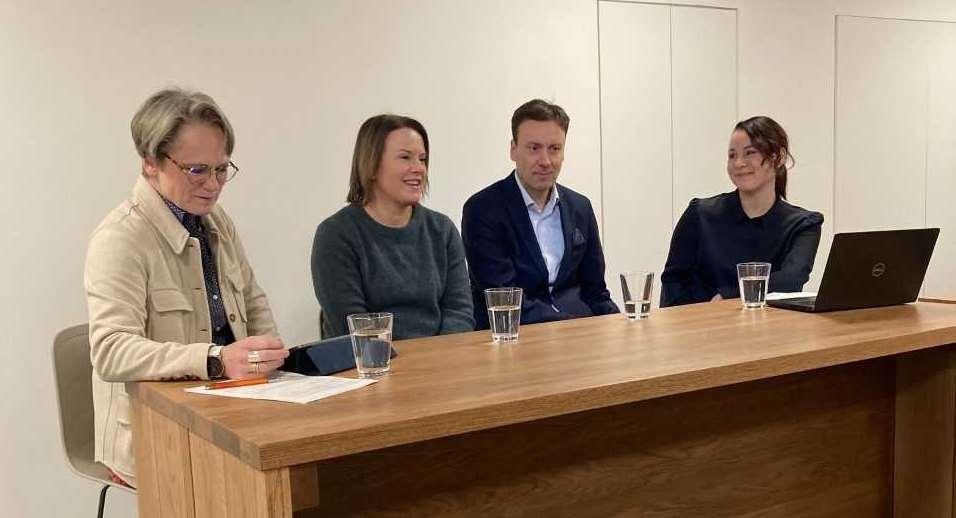
On the 11th of May 2022 Senior Research Fellow Seppo Poutanen was invited to Tiedekulma, University of Helsinki, for a public panel discussion on themes related to digitalisation and platformisation of work, titled “The Many Faces of Platform Work”. The event was organised by The Finnish Association of Work Life Research (FAWORE), Turku Centre for Labour Studies (TCLS), University of Turku and Faculty of Social Sciences, University of Helsinki. Other expert panelists were Research Manager, Adjunct Professor Laura Seppänen (Finnish Institute of Occupational Health) and Doctoral Researcher Benta Mbare (University of Tampere). FAWORE’s board member, Chief Specialist Meri Jalonen (LAB University of Applied Sciences) acted as the moderator of the panel.
The lively discussion, which was streamed online and recorded, touched upon several themes, extending from the interesting difficulties of clearly defining and measuring “platform work”, the relevant EU legislation, and to the specific forms that platform work has taken in Finland thus far. The serious interest and questions from the audience, both on site and online, showed the need for such educating occasions, as the rapidly changing modes of organising work lead to broader questions concerning the platformisation and digitalisation (with its AI and machine learning boosters) of the Finnish society.
The panel discussion is available at: https://tiedekulmamedia.helsinki.fi/fi/web/tiedekulma/player/webcast?playerId=38521893&e ventId=167729107
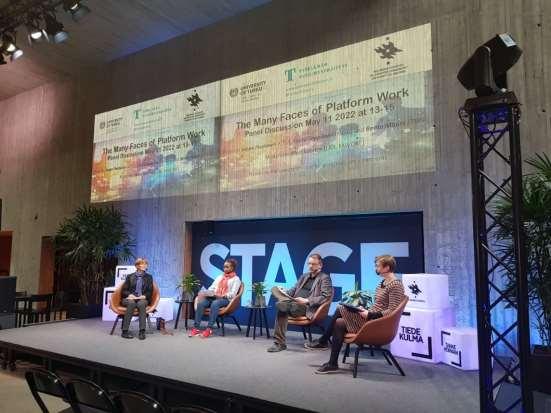
In March 2022, the University of Turku was awarded with the international accreditation of entrepreneurial universities, which was carried out by the Accreditation Council for Entrepreneurial and Engaged Universities(ACEEU).The University of Turku isthe first Finnish universityto achieve the ACEEU accreditation, showing the university’s notable commitment to entrepreneurship and to contributing to social and economic well-being. The accreditation is a sign that the University of Turku provides entrepreneurial training, supports members of the University community in entrepreneurial activities, and produces research with a high potential for commercialisation.
ACEEU accreditation is a new international accreditation under which pilot accreditations have been carried out since 2017. In addition to the University of Turku, 11 pilot universities worldwide have been involved in the accreditation process. Read more about ACEEU on https://www.aceeu.org/.
Social media and other channels are applied to communicate our research and activities to international and domestic stakeholders and networks in an accessible and open manner. Open engagement with society is a central component of our activity at the interface of scientific study and societal dynamics in themes of entrepreneurship, changing modes of work and the digital future. We communicate via our Unit’s social media channels, mainly Facebook, Twitter and Instagram The unit’s social media presence is coordinated at the unit level, but, more importantly, it is based on the activity of a number of faculty members taking part in important conversations across society.
Follow us in various social media channels through the links below:

Project Coordinator Elisa Akola
• European Council of Small Business and Entrepreneurship (ECSB), Executive Secretary
Doctoral Researcher Mohamed Farhoud
• The African Network for Social Entrepreneurship Scholars, co-founder and coordinator
• Africa Academy of Management, Member
• EMES International Research Network, Member
• Catalyst 2030, Member
Professor Jarna Heinonen
• OP osuuskunta / OP Ryhmä (OP co-operative / OP Group), Member and Vice-Chair of the Board of Directors
• TOP-säätiö (TOP Foundation), Board Member and Chair
• Finnish Cultural Foundation in South-West Finland, Member and Vice-Chair of the Board, Chair of the Group (social sciences and economics)
• Economic Policy Working Group, Turku Chamber of Commerce, Member
• The Research Committee of the Finnish Family Firm Association, Member
• European Council of Small Business and Entrepreneurship (ECSB), Member
Professor Ulla Hytti
• European Council for Small Business and Entrepreneurship (ECSB), President
• Engage – Centre for Engaged Education through Entrepreneurship (a Norwegian Center of Excellence in Education), Advisory Board Member
Postdoctoral Researcher Kaisa Hytönen
• European Council of Small Business and Entrepreneurship (ECSB), Member
University Teacher Sanna Ilonen
• Scientific Association for Entrepreneurship Education, Board Member
• European Council of Small Business and Entrepreneurship (ECSB), Member
Professor Anne Kovalainen
• The Finnish Academy of Science and Letters, Member, Selection Committee Member
• The Finnish Society of Sciences and Letters, Member
• CORPUS project (Oslo University) funded by the Research Council of Norway 2019–2023, Advisory Board Member
• Academy of Finland, Strategic Research Council, Member
• National expert group for research on artificial intelligence and digitalisation 2021–2022, Member, Ministry of Finance
• ASA, ISA, Member
Postdoctoral Researcher Kirsi Peura
• Scientific Association for Entrepreneurship Education, Chair
• European Council of Small Business and Entrepreneurship (ECSB), Member
Senior Research Fellow Seppo Poutanen
• National Science Foundation (USA), Member of the Evaluation Faculty
• European Science Foundation, Member of the College of Review Panel
• International Sociological Association (ISA), European Sociological Association (ESA), British Sociological Association (BSA), American Sociological Association (ASA) and Society for Social Studies of Science (4S), Member
Senior Researcher Tommi Pukkinen
• European Council of Small Business and Entrepreneurship (ECSB), Member
Senior Research Fellow Pekka Stenholm
• Academy of Management (AoM), Member
• European Council of Small Business and Entrepreneurship (ECSB), Country Vice-President
• Nordic Conference of Small Business Research, Scientific Committee Member
• Board of Directors of the Foundation of Turun Urheiluliitto, Member
• Steering Group of i9 Innovation Project in Satakunta, Member
Professor Jarna Heinonen
• Head of the Department of Management and Entrepreneurship
• Member of the Education Development Committee, School of Economics, University of Turku,
• Member and Chair of the EMBA Programme Committee/TSE exe Advisory Board, School of Economics, University of Turku
• Member of TSE Council
Professor Ulla Hytti
• Member of the planning committee for Education within UTUGS (University of Turku Graduate School) University of Turku
• Member of the Steering Committee of the Doctoral Programme at the Turku School of Economics, University of Turku
• Member of the Steering Committee of Bachelor Programme of International Management and Entrepreneurship at the Turku School of Economics, University of Turku
Postdoctoral Researcher Kaisa Hytönen
• Member of a steering Group of Well-being and Competence Development, University of Turku
• Member of a steering group of TEVY Yrityselämään! Tulevaisuusajattelu, henkilökohtaiset valmiudet ja projektityö (Introduction to Business: Futures thinking and project work) -course
University Teacher Sanna Ilonen
• Member of the Steering Committee of Bachelor Programme of International Management and Entrepreneurship at the Turku School of Economics, University of Turku
• Member of TSE Council
Professor Anne Kovalainen
• Director and Chair of Board at Turku Centre for Labour Studies, University of Turku
• Member of Board at Turku University Institute for Advanced Studies (TIAS)
• Chair and member of the organising group of the University Profiling area in Digital Futures
Senior Research Fellow Pekka Stenholm
• Member of the Committee for Research and Doctoral Studies at the Turku School of Economics, University of Turku
Doctoral Researcher Mohamed Farhoud
• Editorial board membership: Teaching cases on Social Entrepreneurship in Africa, Emerald
Professor Jarna Heinonen
• Editorial board memberships: International Small Business Journal; Journal of Global Entrepreneurship Research
• Expert assignments: Chair of the review panel for social sciences at South-West Finland Cultural Foundation, Evaluation statements given to the Foundation for Municipal Development and Riksbankens Jubileumsfond, Sweden, Expert for the Icelandic Research Fund
Professor Ulla Hytti
• Editorial board memberships: Entrepreneurship and Regional Development (Associate Editor), Entrepreneurship Education and Pedagogy (Research Editor), International Journal of Entrepreneurial Behaviour and Research, International Journal of Entrepreneurship and Innovation
• Expert assignments: Professional references for professorship at Aalto University, Hobart and William Smith Colleges, Linköping University and University of Southern Denmark; Professional reference for docentship at University of Helsinki; Evaluation statements given to the Research Development Fund and Riksbankens Jubileumsfond, Sweden; Jury member for the European Entrepreneurship Education Award
Postdoctoral Researcher Kaisa Hytönen
• Editorial board membership: Ammattikasvatuksen Aikakauskirja
Professor Anne Kovalainen
• Editorial board memberships: International Small Business Journal, Research in the Sociology of Work, Journal of Global Entrepreneurship Research, Work in the Global Economy
• Expert assignments: RAE University of Vaasa research assessment exercise, Chair of the School of Management international panel; member of the University level panel; Expert for Belgian National Research Council on several research programmes during 2022; Expert for KU Leuven University on Rector’s Funding Scheme; Member of the evaluation committee at Social Sciences and Humanities Research Council of Canada (SSHRC)
Senior Research Fellow Seppo Poutanen
• Editorial board membership: Work in the Global Economy
Senior Research Fellow Pekka Stenholm
• Editorial review board memberships: Management Decision, Small Business Economics, International Small Business Journal
• Co-guest Editor: Small Business Economics Special Issue on the interplay of context and entrepreneurship: the new frontier for contextualization research
Academy of Management Learning and Education
Ammattikasvatuksen Aikakauskirja
Culture and Organisation
Entrepreneurship and Regional Development
Entrepreneurship Education and Pedagogy
Entrepreneurship Theory and Practice
Evidence & Policy
Gender, Work and Organisation
Industry and Higher Education
International Journal of Entrepreneurial Behaviour and Research
International Journal of Entrepreneurship and Innovation
International Journal of Gender and Entrepreneurship
The International Journal of Management Education
International Marketing Review
International Small Business Journal
Journal of Business Venturing
Journal of Business Venturing Insights
Journal of Enterprising Communities: People and Places in the Global Economy
Journal of Global Entrepreneurship Research
Journal of Small Business Management
Pedagogies: An International Journal
Social Policy and Society
• 3E Conference (ECSB Entrepreneurship Education Conference)
• Academy of Management Annual Meeting 2022
• Babson 2023 Conference
• 2022 Diana International Research Conference
• Finnish Entrepreneurship Education conference (Yrittäjyyskasvatuspäivät)
• RENT Research in Entrepreneurship and Small Business Conference
Professor of entrepreneurship Ulla Hytti received the Kerttu Saalasti Award in recognition of her research promoting micro-entrepreneurship and entrepreneurial culture, especially in the field of entrepreneurship education regionally, nationally and internationally. The award was jointly given by the Kerttu Saalasti Foundation and the University of Oulu's Kerttu Saalasti Institute.
Development Specialist Laura Niemi received Entrepreneurship Research of the Year recognition award based on her PhD research on the complex and dynamic phenomenon of creating new value. The recognition was awarded by the Boardman's Business Management Research Group (LJT).
Project Coordinator Elisa Akola
• Organising committee member at 3E 2022 and 2023 Conferences
Project researcher Satu Aaltonen
• Presentation at Industrial Relations in Europe Conference (IREC)/Työelämän tutkimuspäivät 2022 Conference
Professor Ulla Hytti
• Presentation at RENT 2022 Conference
• Presentations at the 2022 Nordic Conference on Small Business Research
• Scientific committee member at the Nordic Conference on Small Business Research 2022
• Organiser of PDW Workshop titled "Gendering Context, Gendering Entrepreneurship: Developing a Research Agenda" with Caroline Essers, Banu Ozkazanc-Pan, Maura McAdam, Sibel Ozasir Kacar & Ulla Hytti, AoM 2022
University Teacher Sanna Ilonen
• Presentations at National Entrepreneurship Education Conference and RENT 2022 Conference
Professor Anne Kovalainen
• Chair of the organising committee at WORK2023
• Presentation at NSA Conference
Senior Research Fellow Seppo Poutanen
• Organising committee member at WORK2023
• Scientific committee member at WORK2023
• Presentations at ATINER, NSA and ICARSH Conferences
Coordinator Marja Rautajoki
• Organising committee member at WORK2023
Senior Research Fellow Pekka Stenholm
• Scientific committee member at the Nordic Conference on Small Business Research
• Presentations at the 2022 Nordic Conference on Small Business Research
• Organiser of the 1st Annual RENT Abstract Writing Workshop 26.4.2022 together with Verena Meyer, Renata Osowska and Jarmila Šebestová
YKTS 2023 National Entrepreneurship Education Conference
YKTS 2023 National Entrepreneurship Education Conference will be organised on 27.-28.9.2023 in Turku. YKTS National Entrepreneurship Education Conference is aimed at researchers, teachers, and practitioners interested in entrepreneurship education. The special goal of the YKTS National Entrepreneurship Education Conference is to bring research and practice closer together. The conferencestyle two-day event also offers a great opportunity for young researchers to practice writing and presenting conference papers. YKTS National Entrepreneurship Education Conference are organised in cooperation with the YKTS Entrepreneurship Education Research Society.
The theme of the 2023 YKTS National Entrepreneurship Education Conference is Critical and reflective perspectives on entrepreneurship education. The purpose is to spark a discussion around the bias of positivity that emphasizes the benefits of entrepreneurship prevailing in entrepreneurship education. This has led to thefact that, while educational institutions actively tryto promote student entrepreneurship, many important aspects are neglected. For example, is entrepreneurship education implemented without questioning familiar didactic and pedagogical solutions? Is entrepreneurship education implemented inclusively? What are the possible unintended or negative learning outcomes of entrepreneurship education? Is an entrepreneurial approach the only possible and right way to act? Is encouraging entrepreneurship ethical considering the polarized income of entrepreneurs? Is it right to encourage entrepreneurship if the business opportunities are not ethically and environmentally sustainable but cause problems for the community or society?
Visit https://sites.utu.fi/ykts2023/en/ for more information.
22nd Nordic Conference on Small Business Research
22nd Nordic Conference on Small Business Research will be organised in Turku,Finland in May 2024. More details are found online: https://ncsbconference2024.org/
Other (e.g. foundations) 15 %
Ministry of Education and Culture 8 %
In 2022, the unit’s revenues from external funding were 366 000 EUR. The most important financier was the European Commission. The main sources of external funding in 2022 are represented below: EU financing 77 %
Journal articles and editorials
Dodd, S., Lage-Arias, S., Berglund, K., Jack, S., Hytti, U., & Verduijn, K. (2022). Transforming enterprise education: sustainable pedagogies of hope and social justice. Entrepreneurship & Regional Development, 34(7–8), 686–700. DOI: 10.1080/08985626.2022.2071999
Hanage, R , Davies, M , Stenholm, P , & Scott, J (2022) Extending the theory of planned behavior – A longitudinal study of entrepreneurial intentions. Entrepreneurship Research Journal, DOI: 10.1515/erj-2022-0142
Hytti, U. (2022) Pourquoi un regard critique pourrait-il bénéficier à l’enseignement de l’entrepreneuriat? Revue de l’Entrepreneuriat, 21(4). DOI: 10.3917/entre.214.0020
Ilonen, S., & Hytönen, K. (2022). Why should I become an intrapreneur? Introducing the concept of intrapreneurial outcome expectations. Entrepreneurship Education and Pedagogy, DOI: 10.1177/251512742210916
Kovalainen, A., Poutanen, S. & Arvonen, J. (2022). Luottamus ja työn valvonta pandemian aikana. Työelämän Tutkimus, 20(3), 333–361. DOI: 10.37455/tt.112955
Niemi, L., Stenholm, P., Hakala, H., & Kantola, J. (2022). Immanent sensemaking by entrepreneurs and the interpretation of consumer context. International Small Business Journal, 40(8), 966–990. DOI: 10.1177/02662426211061531
Peura, K., & Hytti, U. (2022). Identity work of academic teachers in an entrepreneurship training camp: a sensemaking approach. Education + Training, Vol. ahead-of-print No. ahead-of-print. DOI: 10.1108/ET-06-2021-0203.
Radu-Lefebvre, M. & Hytti, U (2022) The joys and pitfalls of writing interesting research. Entrepreneurship and Regional Development, 34(1-2) DOI: 10.1080/08985626.2022.2033852
Comunian, R., Faggian, A., Heinonen, J. & Wilson, N. (eds.) (2022) A Modern Guide to Creative Economies. Elgar Modern Guides. Cheltenham: Edward Elgar Publishing.
Comunian, R., Faggian, A., Heinonen, J. & Wilson, N. (2022). Introduction. In: R. Comunian, A. Faggian, J, Heinonen, J. & N. Wilson (eds.), A Modern Guide to Creative Economies, 1
19. Cheltenham: Edward Elgar Publishing
Ilonen, S. & Hytti, U (2022) Teaching together in entrepreneurship education: live case method. In: K. Wigger, L. Aaboen, D.H. Haneberg, S. Jakobsen & T. Lauvås (eds.) Reframing the Case Method in Entrepreneurship Education. Cases from the Nordic Countries, 76–86. Cheltenham, UK: Edward Elgar Publishing.
Van Waes, S. & Hytönen, K. (2022). Looking Back and Ahead: A Social Network Perspective onWorkplace Learning and Professional Development. In: Harteis, C., Gijbels, D., Kyndt, E. (eds.) Research Approaches on Workplace Learning, 179–199. Professional and Practice-based Learning, vol 31. Springer, Cham. https://doi.org/10.1007/978-3-030-89582-2_8
Guardans, I., Heinonen, J., Comunian, R., Crociata, A., Dent, T., Denti, D., Gross, J., Hytti, U., Kim, S., Kravcenko, D , Pica, V , Popova, D , Pukkinen, T , Sauka, A , Stenholm, P. & Wilson, N (2022 An ecological approach to developing inclusive and sustainable creative economies. European Policy
Brief DISCE Publications
https://disce.eu/wp-content/uploads/2022/08/D6.6-Policy-Brief-topublish.pdf
Heinonen, J , Hytti, U., Hytönen, K , Nieminen, L , Pukkinen, T. & Stenholm, P (2022) Between labour markets and entrepreneurship: entrepreneurial behaviour in the creative economies. DISCE Publications.
https://disce.eu/wp-content/uploads/2022/07/DISCE-D4.2-updated.pdf
Hytti, U , Heinonen, J , Hytönen, K , Kravčenko, D., Lemmetyinen,A ,Mumford,J V., Nieminen, L , Pohjola, T., Popova, D., Pukkinen, T., Sauka, A., Sihvonen, L. & Stenholm, P. (2022). Policy Recommendations: Value creation modelling and earning logics in the creative economies DISCE Publications
https://disce.eu/wp-content/uploads/2022/08/DISCE-4.4.-Policy-recommendationsValue-creation-modelling-and-earning-logics-in-the-creative-economies.pdf
Kuusi, T., Ali-Yrkkö, J., Helanummi-Cole, H., Koski, H., Kovalainen, A., Kässi, O., Poutanen, S., Valmari, N. (2022). Innovaatiot kriisien keskellä: kasvuhaasteita ja vastauksia. ETLA Muistio No. 116. https://pub.etla.fi/ETLA-Muistio-Brief-116.pdf
Pukkinen, T , Heinonen, J , Hytti, U., Hytönen, K , Kravčenko, D., Lemmetyinen, A , Mumford, J. V., Nieminen, L , Pohjola, T , Popova, D , Sauka, A , Sihvonen, L. & Stenholm P (2022). Value creation modelling for creative economies: networks, innovation and digitalization DISCE Publications. https://disce.eu/wp-content/uploads/2022/07/DISCE-D4.3-updated.pdf
Pukkinen, T., Hytönen K., Burlina C., Comunian R., Crociata A., Dent T., Denti D., Faggian A., Gross J.,Heinonen J., Hytti U., Kim S., Kravcenko D., Lemmetyinen A., Nieminen L., Pica V., Popova D., Sauka A., Sihvonen L., Stenholm P., Wilson N. (2022) Regional case study report: Lund, Sweden DISCE Publications. https://disce.eu/wp-content/uploads/2022/05/Regional-Case-StudyReport_Lund.pdf
Hytti, U. (2022). Artistic Darwinians: An Entrepreneurial identity in the creative economy. Paper presented at 21st NCSB Nordic Conference on Small Business Research, Kolding, Denmark, 18-20 May 2022.
Hytti, U. (2022). Creative Darwinian: an entrepreneurial identity in the creative economy. Paper presented at the RENT Research in Entrepreneurship and Small Business Conference, Naples, Italy, 16-18 November 2022.
Hytti, U., Heinonen, J., Hytönen, K. & Nieminen, L. (2022). Repositioning creative freelancers as entrepreneurial agents. Paper presented at the 21st NCSB Nordic Conference on Small Business Research, Kolding, Denmark, 18-20 May 2022.
Ilonen, S., Stenholm, P & Battisti, M. (2022). Entrepreneurial calling creates devoted entrepreneurs: An exploratory study of serial entrepreneurs. Paper presented at the RENT Research in Entrepreneurship and Small Business Conference, Naples, Italy, 16-18 November 2022.
Nielsen Søgaard M., Klyver, K. & Stenholm, P (2022). Networking orientation turning social support into progress – a dynamic model. Paper presented at the 21st NCSB Nordic Conference on Small Business Research, Kolding, Denmark, 18-20 May 2022.
Poutanen, S. (2022) The Digital Office, Seminar and Coffee Room: European Doctoral Researchers Keeping Contact in the Exceptional Period of Pandemic Isolation. Paper presented at the 6th International Conference on Advanced Research in Social Sciences and Humanities, Prague, Czech Republic, 14-16 October 2022.
Poutanen, S. (2022). European Doctoral Researchers in Business and Organisation Studies Telling About the Effects of the COVID-19 Pandemic on their Work - A Qualitative Study. Paper presented at the 9th Annual International Conference on Social Sciences, Athens, Greece, 25-28 July 2022.
Stenholm, P , Hytönen, K , Pukkinen, T. & Heinonen, J (2022) Income inadequacy among creative professionals
An interplay of identity and skills. Paper presented at the 21st NCSB Nordic Conference on Small Business Research, Kolding, Denmark, 18-20 May 2022.
Goby, V.P. (2022) Emirati women’s liminal economic agency: Gendered space within modernity and tradition Turun yliopiston julkaisuja, Annales Universitatis Turkuensis. Series E, part 97, Oeconomica. https://urn.fi/URN:ISBN:978-951-29-9051-1
Paasio, K. (2022) Making sense of the entrepreneurial university – A social constructionist view. Turun yliopiston julkaisuja, Annales Universitatis Turkuensis. Series E, part 89, Oeconomica. https://urn.fi/URN:ISBN:978-951-29-8886-0
Popularised articles and blog posts
Aaltonen, S (2022) Summer is here! DigiReactor-blog, https://digireactor.fi/?p=1431
Aaltonen, S (2022) Thoughts on creativity and diversity in the DigiReactor coaching set. DigiReactor-blog, https://digireactor.fi/?p=1223
Aaltonen, S. & Tuomisto, A (2022) Failing fast or persistently sticking with your idea? DigiReactor-blog, https://digireactor.fi/?p=1901
Heinonen, J. (2022). Luovan talouden yrittäjyydestä kasvua? Blog of the Kerttu Saalasti Insititute 20.5.2022, https://www.oulu.fi/blogs/node/214065
Heinonen, J. & Hytti, U. (2022). Saako luovalla työllä ansaita? Turun Seudun Ekonomit 3/2022, 6–7.https://issuu.com/tsery/docs/turunseudunekonomit_3_2022_issuu
Karinen, M. (2022). A few observations on solar. About those palms blog, https://users.utu.fi/mtwkar/2022/09/22/a-few-observations-on-solar/
Karinen, M (2022) Productivity for sustainability in Oil Palm About those palms blog, https://users.utu.fi/mtwkar/2022/11/04/productivity-for-sustainability-in-oil-palm/.
Karinen, M. (2022). Sustainable infrastructure isn’t car centric. About those palms blog, https://users.utu.fi/mtwkar/2022/09/26/sustainable-infrastructure-isnt-car-centric/.
Söderlund, R , Aaltonen, S , Collanus, E. & Rantanen, M. (2022). Yhteiskehittämisellä kohti resurssiviisasta digitaalista kotihoitoa. Turun Sanomat, Puheenvuoro, 2.4.2022. https://www.ts.fi/puheenvuorot/5611579
Tuomisto, A. & Aaltonen, S. (2022). Teamwork in the core of digital service & product development. DigiReactor-blog, https://digireactor.fi/?p=1826
Tuomisto, A. & Aaltonen, S. (2022). Technical & human – two complementing sides of digital service development. DigiReactor-blog, https://digireactor.fi/?p=1243
Yrittäjyys | Entrepreneurship
Turun kauppakorkeakoulu | Turku School of Economics
Street address: Rehtorinpellonkatu 3, 20500 Turku
Postal address: FI-20014 Turun yliopisto
www.utu.fi/yrittajyys | www.utu.fi/entrepreneurship
Yrittäjyys | Entrepreneurship
Turun kauppakorkeakoulu | Turku School of Economics